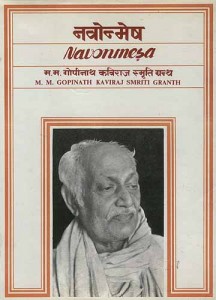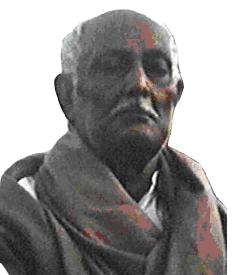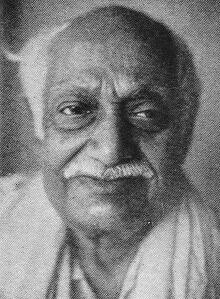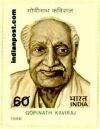Maha Mahopadhya Pandit Gopinath Kaviraj had devoted himself to the pursuit of spiritual studies and meditation under the guidance of his guru, Yogiraj Paramahansa Swami Vishudhanandaji of Varanasi.
Gopinath Kaviraj on whom the title of Mahamahopadhyaya was conferred by the British Government in 1934, is regarded as an authority on Indological studies. Equally at home in English, Hindi, Sanskrit and Bengali and an unparalled combination of traditional and modern India and Western learning and spiritual wisdom he was among those renaissance figures who in the midst of colonial rule and its attendant denigration of Indian tradition helped to revive India’s pride in her past and infuse it with the best tradition of British liberation.
An insatiable thirst for knowledge coupled with an open and analytical mind led him to search for something new in the ancient Sanskrit texts and various commentaries on them. He wrote with a rare insight whether it was on Tantra, Philosophy, Religion or culture. His biographic in content, have the flavour of real literature.
Pandit Gopinath Kaviraj, who has become a legendary figure in the field of Indological studies, was born in a Bengali Brahmin family on 7th September, 1887 in the District of Dhaka, in Bangla Desh.
Being a posthumous child, after having passed through many vicissitudes he passed his B.A. examination from Maharaja’s College, Jaipur with academic distinctions. The final phase of his education started at Varanasi in 1910 under the loving care and guidance of Dr. Arthur Venis, the then Principal of Government Sanskrit College and got the M.A. degree in Sanskrit in 1913, standing first in order of merit.
At the instance of Dr. Venis he was soon appointed Librarian of the famous Saraswati Bhavan Library and whole-heartedly started his career of research. From now on for the next 62-years he remained uninterruptedly and deeply engrossed in dissemination of knowledge till he left his body on 12th June 1976 in the holy city of Varanasi itself.
Mahamahopadhya Pandit Gopinath Kaviraj Ji
He delved deep into the so far unexplored wealth of learning and got published about seventy-two books which opened for all a new horizon in the field of Indological studies and research. He discovered in most of his studies completely new meanings and shed new light not only on different branches of philosophy, but also on Ancient Indian History, Epigraphy, Kashmir Shaivism, Buddhism, Jainism, Christian mysticism and Sufism as well, which are considered to be the invaluable guide to academic and spiritual research for generations to come.
For 23 years he served the Sanskrit College, Varanasi first as Librarian and subsequently as Principal, till he voluntarily retired in 1937 in order to devote himself fully in his life-long pursuit of spiritual studies and intense sadhana under the guidance of his Guru, the great Yogi Visuddhanandaji of Varanasi.
The Government of India conferred upon him the title of Mahamahopadhyaya in 1934, Coronation Medal in 1937 and the title of ‘Padmavibhusana’ in 1964. Many an Indian university honoured itself by bestowing upon the great personality various degrees and certificates of honour.
Gifted through divine grace with a prodigious memory and rare prajna, Pt. Gopinath Kaviraj became a name to conjure with. He was indeed a rare combination not only of uncommon erudition but also of singular Yogi experience.
Govt. of India issued a commemorative stamp in honour of Pandit Gopinath Kaviraj
Postal Stamp Image of M.M.Gopinath Kaviraj Ji
Stamp Information as presented by Govt.of India
Mahamahopadhyaya Pandit Gopinath Kaviraj, a stalwart in the field of Indological studies, was born on 7th September, 1887 at Dhamrai, in the Dhaka District, now in Bangladesh.
Studying initially, at Dhaka and Jaipur, he later obtained the Master’s Degree in Sanskrit from the Government Sanskrit College, Varanasi. Appointed Librarian of the famous Saraswati Bhavan Library at the same college, he devoted himself wholeheartedly to research.
He declined the offer of Professorship at Calcutta University and in the Department of Oriental Studies, London University. He edited and got published 72 books in the Saraswati Bhavan Text and study Series, opening a new horizon in the field of Indological studies and research. He had mastered various branches of Indian and Western Philosophy and had a profound knowledge of and insight into Christian mysticism and Sufism as well. His studies shed new light on different branches of Indian philosophy, Ancient Indian History, Epigraphy, Kashmir Saivism, Buddhism, Jainism, etc., considered invaluable guides to academic and spiritual research.
For 23 years he served the Government Sanskrit College, Varanasi first as Librarian and later as Principal, till he voluntarily retired in 1937. He devoted himself subsequently to the pursuit of spiritual studies and meditation under the guidance of his guru, Yogi Paramahansa Swami Vishudhanandaji of Varanasi. His services in the field of scholarship received recognition from the then Government of India in 1934 and 1937 when he was awarded the title of ‘Mahamahopadhyaya’ and later the Coronation Medal. In 1964 the Government of India conferred the title of ‘Padmavibhushan’ on him.
He was a rare combination not only of uncommon erudition but also of singular Yogic experience. To him knowledge stood for ‘Para Vidya’ (Supreme Knowledge) which has no other objective than the realisation of Ultimate Reality. Universal salvation is, according to him, the ultimate goal towards which the entire creation has been moving. He died on 12th June, 1976 at Varanasi.
Text Courtesy: Mahamahopadhyaya Pandit Gopinath Kaviraj Birth Centenary celebration Committee – http://www.exoticindiaart.com/book/details/IDF939/





